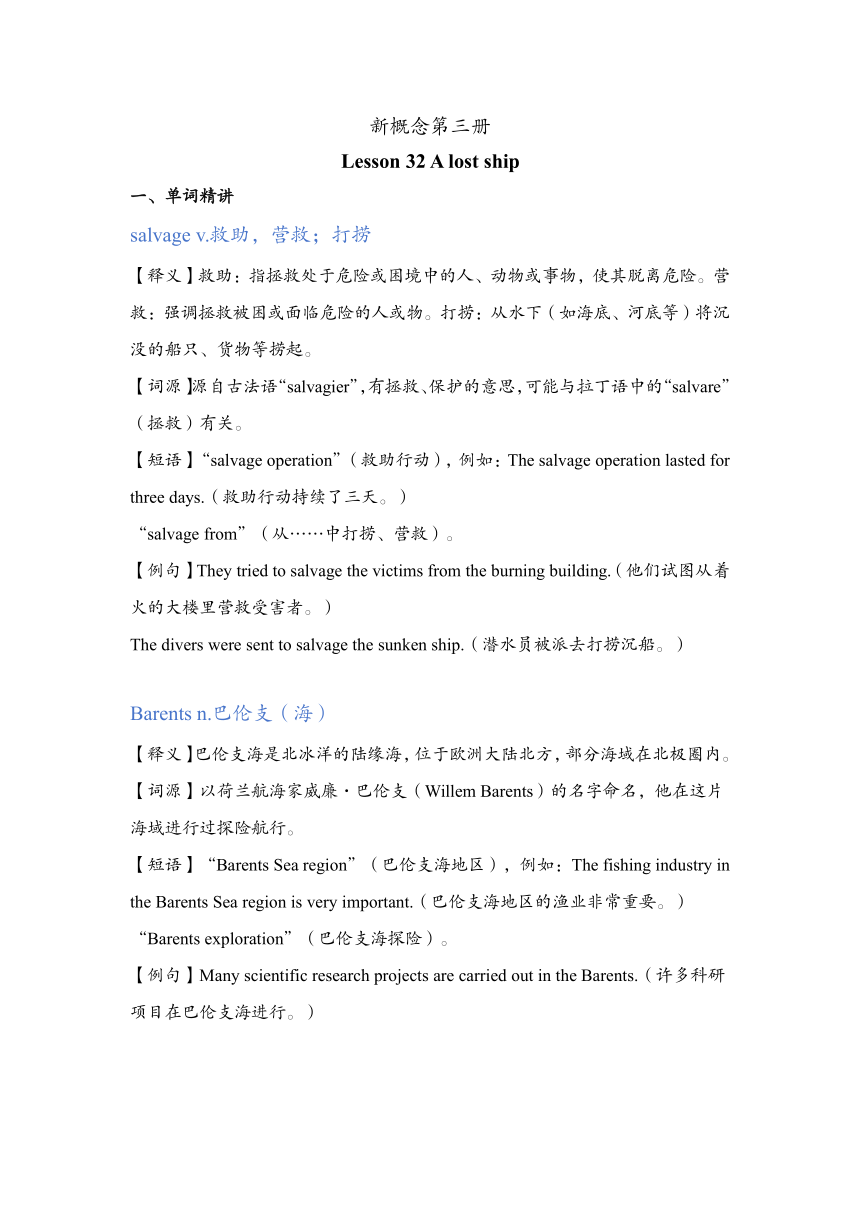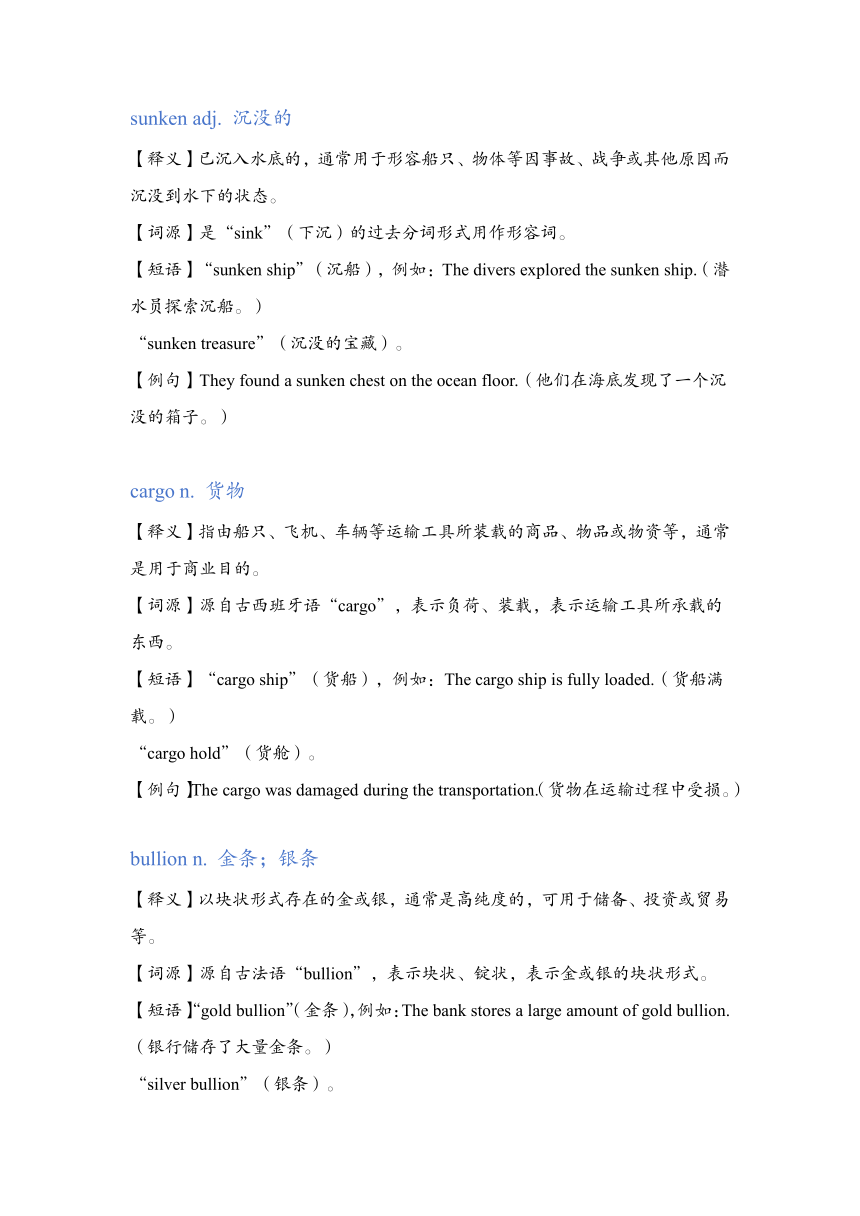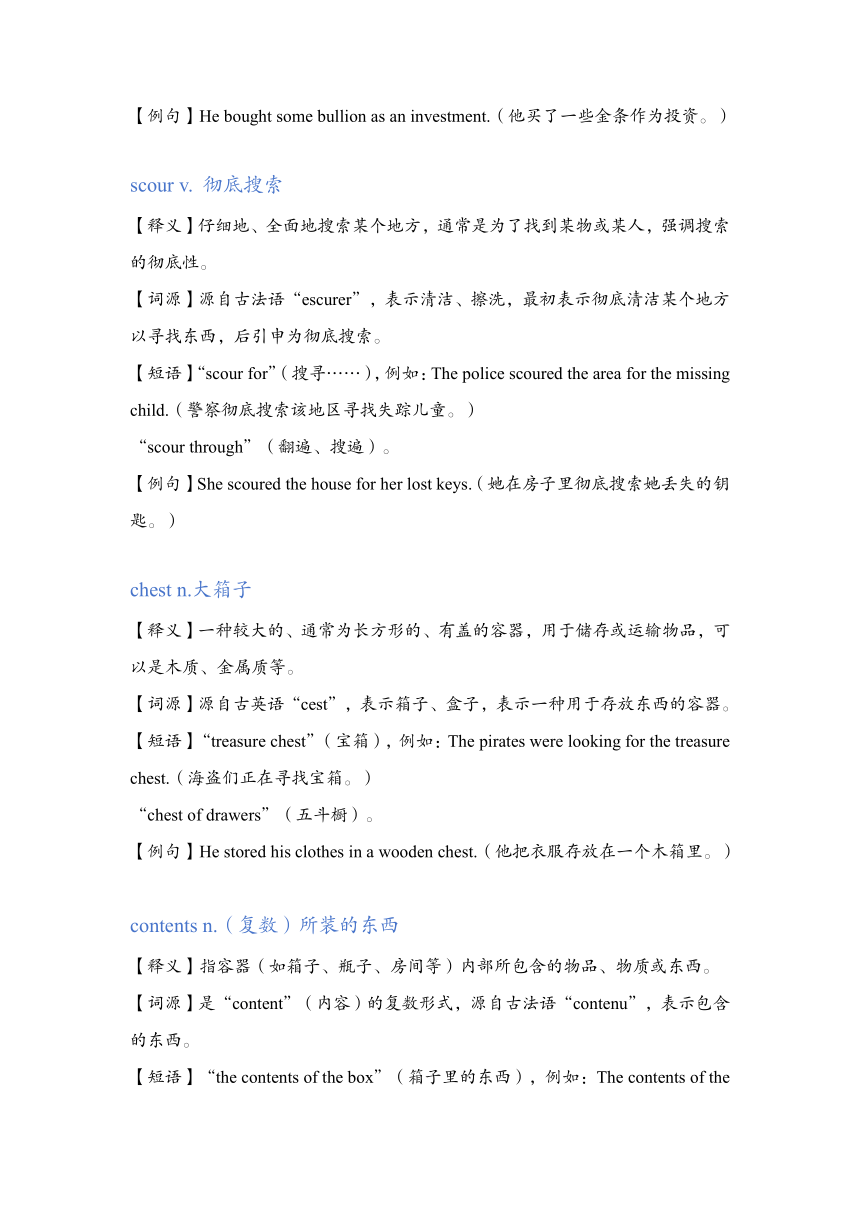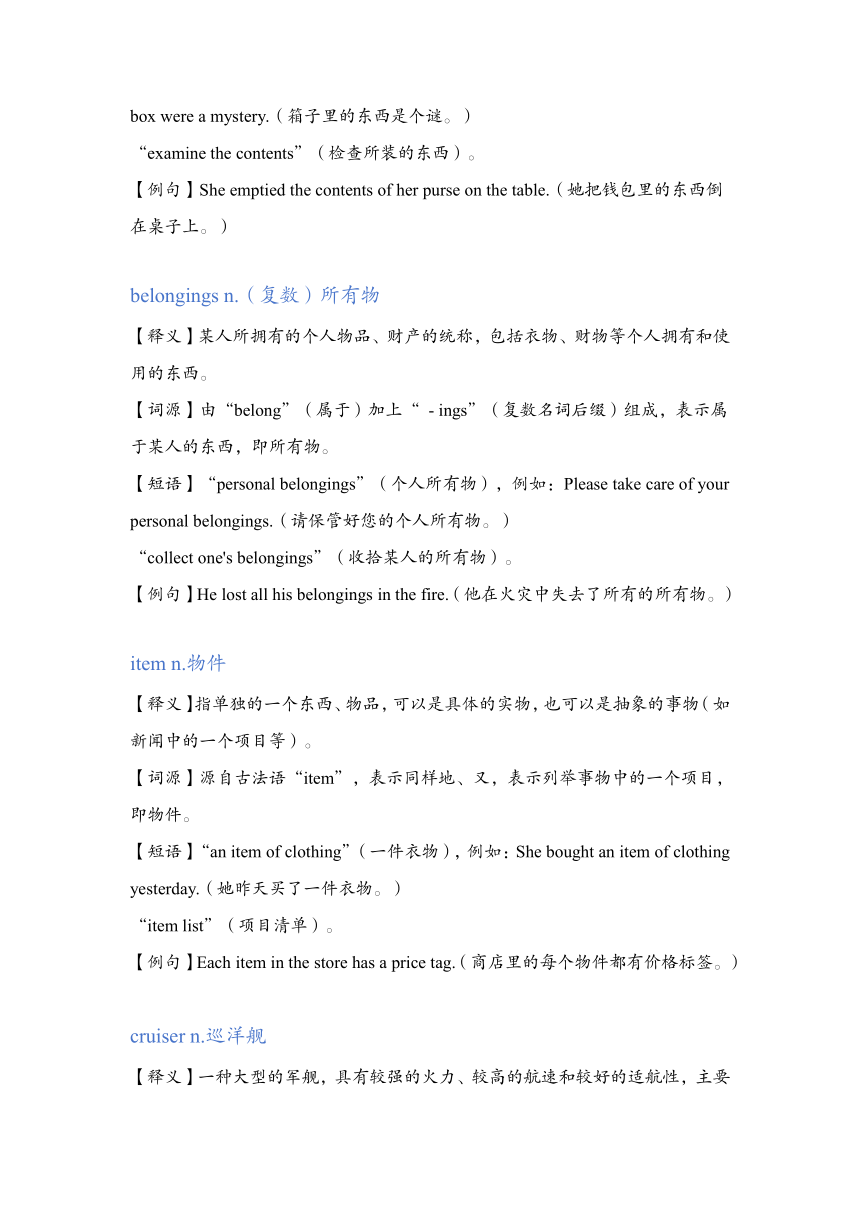新概念第三册 Lesson 32 A lost ship 讲义
文档属性
| 名称 | 新概念第三册 Lesson 32 A lost ship 讲义 |  | |
| 格式 | docx | ||
| 文件大小 | 162.0KB | ||
| 资源类型 | 教案 | ||
| 版本资源 | 新概念英语 | ||
| 科目 | 英语 | ||
| 更新时间 | 2024-12-04 17:28:08 | ||
图片预览





文档简介
新概念第三册
Lesson 32 A lost ship
单词精讲
salvage v.救助,营救;打捞
【释义】救助:指拯救处于危险或困境中的人、动物或事物,使其脱离危险。营救:强调拯救被困或面临危险的人或物。打捞:从水下(如海底、河底等)将沉没的船只、货物等捞起。
【词源】源自古法语“salvagier”,有拯救、保护的意思,可能与拉丁语中的“salvare”(拯救)有关。
【短语】“salvage operation”(救助行动),例如:The salvage operation lasted for three days.(救助行动持续了三天。)
“salvage from”(从……中打捞、营救)。
【例句】They tried to salvage the victims from the burning building.(他们试图从着火的大楼里营救受害者。)
The divers were sent to salvage the sunken ship.(潜水员被派去打捞沉船。)
Barents n.巴伦支(海)
【释义】巴伦支海是北冰洋的陆缘海,位于欧洲大陆北方,部分海域在北极圈内。
【词源】以荷兰航海家威廉·巴伦支(Willem Barents)的名字命名,他在这片海域进行过探险航行。
【短语】“Barents Sea region”(巴伦支海地区),例如:The fishing industry in the Barents Sea region is very important.(巴伦支海地区的渔业非常重要。)
“Barents exploration”(巴伦支海探险)。
【例句】Many scientific research projects are carried out in the Barents.(许多科研项目在巴伦支海进行。)
sunken adj. 沉没的
【释义】已沉入水底的,通常用于形容船只、物体等因事故、战争或其他原因而沉没到水下的状态。
【词源】是“sink”(下沉)的过去分词形式用作形容词。
【短语】“sunken ship”(沉船),例如:The divers explored the sunken ship.(潜水员探索沉船。)
“sunken treasure”(沉没的宝藏)。
【例句】They found a sunken chest on the ocean floor.(他们在海底发现了一个沉没的箱子。)
cargo n. 货物
【释义】指由船只、飞机、车辆等运输工具所装载的商品、物品或物资等,通常是用于商业目的。
【词源】源自古西班牙语“cargo”,表示负荷、装载,表示运输工具所承载的东西。
【短语】“cargo ship”(货船),例如:The cargo ship is fully loaded.(货船满载。)
“cargo hold”(货舱)。
【例句】The cargo was damaged during the transportation.(货物在运输过程中受损。)
bullion n. 金条;银条
【释义】以块状形式存在的金或银,通常是高纯度的,可用于储备、投资或贸易等。
【词源】源自古法语“bullion”,表示块状、锭状,表示金或银的块状形式。
【短语】“gold bullion”(金条),例如:The bank stores a large amount of gold bullion.(银行储存了大量金条。)
“silver bullion”(银条)。
【例句】He bought some bullion as an investment.(他买了一些金条作为投资。)
scour v. 彻底搜索
【释义】仔细地、全面地搜索某个地方,通常是为了找到某物或某人,强调搜索的彻底性。
【词源】源自古法语“escurer”,表示清洁、擦洗,最初表示彻底清洁某个地方以寻找东西,后引申为彻底搜索。
【短语】“scour for”(搜寻……),例如:The police scoured the area for the missing child.(警察彻底搜索该地区寻找失踪儿童。)
“scour through”(翻遍、搜遍)。
【例句】She scoured the house for her lost keys.(她在房子里彻底搜索她丢失的钥匙。)
chest n.大箱子
【释义】一种较大的、通常为长方形的、有盖的容器,用于储存或运输物品,可以是木质、金属质等。
【词源】源自古英语“cest”,表示箱子、盒子,表示一种用于存放东西的容器。
【短语】“treasure chest”(宝箱),例如:The pirates were looking for the treasure chest.(海盗们正在寻找宝箱。)
“chest of drawers”(五斗橱)。
【例句】He stored his clothes in a wooden chest.(他把衣服存放在一个木箱里。)
contents n.(复数)所装的东西
【释义】指容器(如箱子、瓶子、房间等)内部所包含的物品、物质或东西。
【词源】是“content”(内容)的复数形式,源自古法语“contenu”,表示包含的东西。
【短语】“the contents of the box”(箱子里的东西),例如:The contents of the box were a mystery.(箱子里的东西是个谜。)
“examine the contents”(检查所装的东西)。
【例句】She emptied the contents of her purse on the table.(她把钱包里的东西倒在桌子上。)
belongings n.(复数)所有物
【释义】某人所拥有的个人物品、财产的统称,包括衣物、财物等个人拥有和使用的东西。
【词源】由“belong”(属于)加上“ - ings”(复数名词后缀)组成,表示属于某人的东西,即所有物。
【短语】“personal belongings”(个人所有物),例如:Please take care of your personal belongings.(请保管好您的个人所有物。)
“collect one's belongings”(收拾某人的所有物)。
【例句】He lost all his belongings in the fire.(他在火灾中失去了所有的所有物。)
item n.物件
【释义】指单独的一个东西、物品,可以是具体的实物,也可以是抽象的事物(如新闻中的一个项目等)。
【词源】源自古法语“item”,表示同样地、又,表示列举事物中的一个项目,即物件。
【短语】“an item of clothing”(一件衣物),例如:She bought an item of clothing yesterday.(她昨天买了一件衣物。)
“item list”(项目清单)。
【例句】Each item in the store has a price tag.(商店里的每个物件都有价格标签。)
cruiser n.巡洋舰
【释义】一种大型的军舰,具有较强的火力、较高的航速和较好的适航性,主要用于远洋作战、巡逻、护航等任务。
【词源】源自古法语“croisier”,与“croix”(十字架)有关,最初指用于海上作战和巡航的船只。
【短语】“heavy cruiser”(重型巡洋舰),例如:The navy sent a heavy cruiser to the area.(海军派遣了一艘重型巡洋舰到该地区。)
“cruiser fleet”(巡洋舰舰队)。
【例句】The cruiser patrolled the coastline.(巡洋舰在海岸线巡逻。)
find n.找到的物品
【释义】作为名词时,表示通过寻找、探索或偶然机会发现的东西、物品。
【词源】是“find”(找到、发现)的名词形式,源自古英语“findan”。
【短语】“a great find”(一个重大发现),例如:The archaeologist made a great find in the ancient tomb.(考古学家在古墓中有一个重大发现。)
“lucky find”(幸运的发现)。
【例句】His find in the attic was very valuable.(他在阁楼的发现非常有价值。)
log book 航海日志
【释义】船舶在航行过程中,船员用来记录航海相关信息(如航向、航速、天气、航海事件等)的书面记录册。
【词源】“log”源自古挪威语“logg”,表示一块木头,最初航海时用木头记录一些简单信息,后来演变成航海日志;“book”表示书籍、册子。
【短语】“write in the log book”(写航海日志),例如:The captain wrote every day in the log book.(船长每天写航海日志。)
“check the log book”(查看航海日志)。
【例句】The log book provided important information about the ship's journey.(航海日志提供了关于船舶航程的重要信息。)
piece v. 拼成整体
【释义】把分散的部分组合、拼凑在一起,使其成为一个完整的整体。
【词源】源自古法语“pece”,表示一块、部分,表示将部分组合成整体。
【短语】“piece together”(拼凑、组合),例如:They tried to piece together the broken vase.(他们试图把破碎的花瓶拼凑起来。)
“piece from”(从……拼凑)。
【例句】She pieced the quilt from scraps of fabric.(她用碎布拼成被子。)
convoy n.护航
【释义】指为保护船只、车辆等运输工具及其运载的货物、人员等安全而进行的伴随性护送行为,也可指执行护航任务的舰队、车队等。
【词源】源自古法语“convoyer”,表示护送、伴送,表示护送行为或执行护送任务的队伍。
【短语】“convoy escort”(护航护卫队),例如:The convoy escort protected the merchant ships.(护航护卫队保护商船。)
“in convoy”(在护航下)。
【例句】The tanker sailed under convoy.(油轮在护航下航行。)
torpedo v.用鱼雷攻击
【释义】使用鱼雷这种武器对目标(如船只、潜艇等)进行攻击,是一种在海战中的攻击方式。
【词源】源自古西班牙语“torpedo”,表示电鳐(一种能放电的鱼),因其形状像鱼雷且有攻击性而得名,后用于表示鱼雷攻击。
【短语】“torpedo a ship”(用鱼雷攻击一艘船),例如:The enemy submarine torpedoed our cruiser.(敌方潜艇用鱼雷攻击了我们的巡洋舰。)
【例句】They planned to torpedo the enemy's supply ship.(他们计划用鱼雷攻击敌人的补给船。)
submarine n. 潜水艇
【释义】一种能在水下航行的舰艇,可用于军事作战(如攻击敌舰、进行侦察等)、科学研究、海洋探索等目的。
【词源】由“sub - ”(下)和“marine”(海洋的)组成,表示在海洋下面的舰艇,即潜水艇。
【短语】“nuclear submarine”(核潜艇),例如:The nuclear submarine is very powerful.(核潜艇非常强大。)
“submarine warfare”(潜艇战)。
【例句】The submarine dived deep into the ocean.(潜水艇潜入海洋深处。)
naval adj. 海军的
【释义】与海军有关的,涉及海军的编制、装备、作战、活动等方面的。
【词源】源自古法语“naval”,在拉丁语中有“navalis”,与“navis”(船)有关,表示与船、海军有关的。
【短语】“naval base”(海军基地),例如:The naval base is located on the coast.(海军基地位于海岸线上。)
“naval fleet”(海军舰队)。
【例句】The naval forces are on high alert.(海军部队处于高度戒备状态。)
ministry n.(政府的)部
【释义】政府中的一个部门,负责特定领域(如教育、卫生、外交等)的行政管理、政策制定和执行等工作。
【词源】源自古法语“ministère”,在拉丁语中有“ministerium”,表示服务、职事,表示为政府服务的部门,即政府的部。
【短语】“Ministry of Education”(教育部),例如:The Ministry of Education promotes educational reform.(教育部推动教育改革。)
“ministry official”(部委官员)。
【例句】The ministry is responsible for environmental protection.(这个部负责环境保护。)
二、课文精讲
1.The salvage operation had been a complete failure.打捞工作彻底失败了。
a complete failure的意思是“彻底的失败”。
2.The small ship, Elkor,which had been searching the Barents Sea for weeks, was on its way home.小船“埃尔科”号在巴伦支海搜寻了几个星期之后,正在返航途中。
Elkor是ship的同位语,起解释说明ship的作用。Which引导非限制性定语从句,修饰ship。
3.A radio message from the main land had been received by the ship's captain conducting him to give up the search.返航前,该船船长收到了大陆发来的电报,指示他们放弃这次搜寻。
from the main land是介词短语,作后置定语,修饰radio message,即“从…发来的电报”。
4. The captain knew that another attempt would be made later, for the sunken ship he was trying to find had been carrying a precious cargo of gold bullion.船长知道日后还会再作尝试,因为他试图寻找的沉船上载有一批珍贵的金条。
make an attempt的意思是“努力”,sunken ship的意思是“沉船”,gold bullion的意思是“金条”。
5. Despite the message, the captain of the Elkor decided to try once more.尽管船长接了电报,他还是决定再试一试。
despite引导让步状语,说明“一个前提条件是…(但是…)”。
decide to try once more的意思是“再试一次”。
6. The sea bed was scoured with powerful nets and there was tremendous excitement on board when a chest was raised from the bottom.他们用结实的网把海床搜索了一遍。当一只箱子从海底被打捞上来时,甲板上人们激动不已。
注意powerful的本意是“有力的”,在此引申为“结实的”。
scour相当于search completely,意思是“彻底搜索”;be raised from的意思是“被从…中捞起来”。
7. Though the crew were at first under the impression that the lost ship had been found, the contents of the chest proved them wrong.船员们开始认为沉船找着了,但海底沉箱内的物品证明他们弄错了。
though引导让步状语从句,从句中又含有一个that引导的同位语从句,对impression进行解释说明。
8. What they had in fact found was a ship which had been sunk many years before.事实上,他们发现的是另一艘沉没多年的船。
从句what they had in fact found作句子的主语,which引导定语从句,修饰ship,即“沉没多年的船”。
9. The chest contained the personal belongings of a seaman, Alan Fielding.木箱内装有水手艾伦菲尔丁的私人财物。
Alan Fielding是seaman的同位语。personal belongings的意思是“个人物品”。
10. There were books, clothing and photographs,together with letters which the seaman had once received from his wife.其中有书箱、衣服、照片以及水手收到的妻子的来信。
which引导定语从句,修饰letters,即“…的信”。
11. The captain of the Elkor ordered his men to salvage as much as possible from the wreck.“埃尔科”号船长命令船员们尽量从沉船中打捞物品。
as much as possible表示“尽一切可能”,作比较状语。
12. Nothing of value was found, but the numerous items which were brought to the surface proved to be of great interest.但没发现什么值钱的东西,不过打捞出来的众多的物品还是引起了大家极大的兴趣。
nothing of value相当于nothing valubale。Which引导定语从句,修饰items,表示“…的物品”。
13. From a heavy gun that was raised, the captain realized that the ship must have been a cruiser.从捞起的一门大炮来看,船长认为那艘船一定是艘巡洋舰。
that was raised是定语从句,修饰gun。后面分句中的that引导宾语从句,交代realised的内容。注意,must have been不表示对现在情况的推测,而是对过去情况的推测。
14. In another chest, which contained the belongings of a ship's officer, there was an unfinished letter which had been written on March 14th, 1943.另一只海底沉箱中装的是船上一位军官的财物,其中有一封写于1943年3月14日的信,但没有写完。
第一个which引导非限制性定语从句,修饰chest。第二个which引导定语从句,修饰letter。
15. The captain learnt from the letter that the name of the lost ship was the Karen.从这封信中船长了解到沉船船名是“卡伦”号。
这句话的主体结构是“learn from…+宾语从句”。
16. The most valuable find of all was the ship's log book, parts of which it was still possible to read.打捞到的东西中最有价值的是船上的航海日志,其中有一部分仍然清晰可读。
which引导非限制性定语从句,修饰log book。后半句改写为正常语序就是it was still possible to read parts of the log book.
be still possible to read的意思是“仍然可读”。
17. From this the captain was able to piece together all the information that had come to light.据此,船长可以将所有的那些已经搞清的材料拼凑起来。
was able to piece together的意思是“(过去)成功地讲这些碎片拼在一起了”。That引导定语从句,修饰information。
come to light的意思是“重见天日”。
18. The Karen had been sailing in a convoy to Russia when she was torpedoed by an enemy submarine.“卡伦”号当年在为其他船只护航驶往俄国的途中突然遭到敌方潜水艇鱼雷的袭击。
she指代“卡伦”号,这是典型的拟人修辞格。
19. This was later confirmed by a naval official at the Ministry of Defence after the Elkor had returned home.这一说法在“埃尔科”号返航后得到的国防部一位海军官员的证实。
be confirmed by的意思是“被…证实”。After引导时间状语从句,交代“埃尔科”号返航后发生的事情。
20. All the items that were foundwere sent to the War Museum.那次打捞到的所有物品均被送往军事博物馆。
that were found是定语从句,修饰items;be sent to的意思是“被送往”。
Lesson 32 A lost ship
单词精讲
salvage v.救助,营救;打捞
【释义】救助:指拯救处于危险或困境中的人、动物或事物,使其脱离危险。营救:强调拯救被困或面临危险的人或物。打捞:从水下(如海底、河底等)将沉没的船只、货物等捞起。
【词源】源自古法语“salvagier”,有拯救、保护的意思,可能与拉丁语中的“salvare”(拯救)有关。
【短语】“salvage operation”(救助行动),例如:The salvage operation lasted for three days.(救助行动持续了三天。)
“salvage from”(从……中打捞、营救)。
【例句】They tried to salvage the victims from the burning building.(他们试图从着火的大楼里营救受害者。)
The divers were sent to salvage the sunken ship.(潜水员被派去打捞沉船。)
Barents n.巴伦支(海)
【释义】巴伦支海是北冰洋的陆缘海,位于欧洲大陆北方,部分海域在北极圈内。
【词源】以荷兰航海家威廉·巴伦支(Willem Barents)的名字命名,他在这片海域进行过探险航行。
【短语】“Barents Sea region”(巴伦支海地区),例如:The fishing industry in the Barents Sea region is very important.(巴伦支海地区的渔业非常重要。)
“Barents exploration”(巴伦支海探险)。
【例句】Many scientific research projects are carried out in the Barents.(许多科研项目在巴伦支海进行。)
sunken adj. 沉没的
【释义】已沉入水底的,通常用于形容船只、物体等因事故、战争或其他原因而沉没到水下的状态。
【词源】是“sink”(下沉)的过去分词形式用作形容词。
【短语】“sunken ship”(沉船),例如:The divers explored the sunken ship.(潜水员探索沉船。)
“sunken treasure”(沉没的宝藏)。
【例句】They found a sunken chest on the ocean floor.(他们在海底发现了一个沉没的箱子。)
cargo n. 货物
【释义】指由船只、飞机、车辆等运输工具所装载的商品、物品或物资等,通常是用于商业目的。
【词源】源自古西班牙语“cargo”,表示负荷、装载,表示运输工具所承载的东西。
【短语】“cargo ship”(货船),例如:The cargo ship is fully loaded.(货船满载。)
“cargo hold”(货舱)。
【例句】The cargo was damaged during the transportation.(货物在运输过程中受损。)
bullion n. 金条;银条
【释义】以块状形式存在的金或银,通常是高纯度的,可用于储备、投资或贸易等。
【词源】源自古法语“bullion”,表示块状、锭状,表示金或银的块状形式。
【短语】“gold bullion”(金条),例如:The bank stores a large amount of gold bullion.(银行储存了大量金条。)
“silver bullion”(银条)。
【例句】He bought some bullion as an investment.(他买了一些金条作为投资。)
scour v. 彻底搜索
【释义】仔细地、全面地搜索某个地方,通常是为了找到某物或某人,强调搜索的彻底性。
【词源】源自古法语“escurer”,表示清洁、擦洗,最初表示彻底清洁某个地方以寻找东西,后引申为彻底搜索。
【短语】“scour for”(搜寻……),例如:The police scoured the area for the missing child.(警察彻底搜索该地区寻找失踪儿童。)
“scour through”(翻遍、搜遍)。
【例句】She scoured the house for her lost keys.(她在房子里彻底搜索她丢失的钥匙。)
chest n.大箱子
【释义】一种较大的、通常为长方形的、有盖的容器,用于储存或运输物品,可以是木质、金属质等。
【词源】源自古英语“cest”,表示箱子、盒子,表示一种用于存放东西的容器。
【短语】“treasure chest”(宝箱),例如:The pirates were looking for the treasure chest.(海盗们正在寻找宝箱。)
“chest of drawers”(五斗橱)。
【例句】He stored his clothes in a wooden chest.(他把衣服存放在一个木箱里。)
contents n.(复数)所装的东西
【释义】指容器(如箱子、瓶子、房间等)内部所包含的物品、物质或东西。
【词源】是“content”(内容)的复数形式,源自古法语“contenu”,表示包含的东西。
【短语】“the contents of the box”(箱子里的东西),例如:The contents of the box were a mystery.(箱子里的东西是个谜。)
“examine the contents”(检查所装的东西)。
【例句】She emptied the contents of her purse on the table.(她把钱包里的东西倒在桌子上。)
belongings n.(复数)所有物
【释义】某人所拥有的个人物品、财产的统称,包括衣物、财物等个人拥有和使用的东西。
【词源】由“belong”(属于)加上“ - ings”(复数名词后缀)组成,表示属于某人的东西,即所有物。
【短语】“personal belongings”(个人所有物),例如:Please take care of your personal belongings.(请保管好您的个人所有物。)
“collect one's belongings”(收拾某人的所有物)。
【例句】He lost all his belongings in the fire.(他在火灾中失去了所有的所有物。)
item n.物件
【释义】指单独的一个东西、物品,可以是具体的实物,也可以是抽象的事物(如新闻中的一个项目等)。
【词源】源自古法语“item”,表示同样地、又,表示列举事物中的一个项目,即物件。
【短语】“an item of clothing”(一件衣物),例如:She bought an item of clothing yesterday.(她昨天买了一件衣物。)
“item list”(项目清单)。
【例句】Each item in the store has a price tag.(商店里的每个物件都有价格标签。)
cruiser n.巡洋舰
【释义】一种大型的军舰,具有较强的火力、较高的航速和较好的适航性,主要用于远洋作战、巡逻、护航等任务。
【词源】源自古法语“croisier”,与“croix”(十字架)有关,最初指用于海上作战和巡航的船只。
【短语】“heavy cruiser”(重型巡洋舰),例如:The navy sent a heavy cruiser to the area.(海军派遣了一艘重型巡洋舰到该地区。)
“cruiser fleet”(巡洋舰舰队)。
【例句】The cruiser patrolled the coastline.(巡洋舰在海岸线巡逻。)
find n.找到的物品
【释义】作为名词时,表示通过寻找、探索或偶然机会发现的东西、物品。
【词源】是“find”(找到、发现)的名词形式,源自古英语“findan”。
【短语】“a great find”(一个重大发现),例如:The archaeologist made a great find in the ancient tomb.(考古学家在古墓中有一个重大发现。)
“lucky find”(幸运的发现)。
【例句】His find in the attic was very valuable.(他在阁楼的发现非常有价值。)
log book 航海日志
【释义】船舶在航行过程中,船员用来记录航海相关信息(如航向、航速、天气、航海事件等)的书面记录册。
【词源】“log”源自古挪威语“logg”,表示一块木头,最初航海时用木头记录一些简单信息,后来演变成航海日志;“book”表示书籍、册子。
【短语】“write in the log book”(写航海日志),例如:The captain wrote every day in the log book.(船长每天写航海日志。)
“check the log book”(查看航海日志)。
【例句】The log book provided important information about the ship's journey.(航海日志提供了关于船舶航程的重要信息。)
piece v. 拼成整体
【释义】把分散的部分组合、拼凑在一起,使其成为一个完整的整体。
【词源】源自古法语“pece”,表示一块、部分,表示将部分组合成整体。
【短语】“piece together”(拼凑、组合),例如:They tried to piece together the broken vase.(他们试图把破碎的花瓶拼凑起来。)
“piece from”(从……拼凑)。
【例句】She pieced the quilt from scraps of fabric.(她用碎布拼成被子。)
convoy n.护航
【释义】指为保护船只、车辆等运输工具及其运载的货物、人员等安全而进行的伴随性护送行为,也可指执行护航任务的舰队、车队等。
【词源】源自古法语“convoyer”,表示护送、伴送,表示护送行为或执行护送任务的队伍。
【短语】“convoy escort”(护航护卫队),例如:The convoy escort protected the merchant ships.(护航护卫队保护商船。)
“in convoy”(在护航下)。
【例句】The tanker sailed under convoy.(油轮在护航下航行。)
torpedo v.用鱼雷攻击
【释义】使用鱼雷这种武器对目标(如船只、潜艇等)进行攻击,是一种在海战中的攻击方式。
【词源】源自古西班牙语“torpedo”,表示电鳐(一种能放电的鱼),因其形状像鱼雷且有攻击性而得名,后用于表示鱼雷攻击。
【短语】“torpedo a ship”(用鱼雷攻击一艘船),例如:The enemy submarine torpedoed our cruiser.(敌方潜艇用鱼雷攻击了我们的巡洋舰。)
【例句】They planned to torpedo the enemy's supply ship.(他们计划用鱼雷攻击敌人的补给船。)
submarine n. 潜水艇
【释义】一种能在水下航行的舰艇,可用于军事作战(如攻击敌舰、进行侦察等)、科学研究、海洋探索等目的。
【词源】由“sub - ”(下)和“marine”(海洋的)组成,表示在海洋下面的舰艇,即潜水艇。
【短语】“nuclear submarine”(核潜艇),例如:The nuclear submarine is very powerful.(核潜艇非常强大。)
“submarine warfare”(潜艇战)。
【例句】The submarine dived deep into the ocean.(潜水艇潜入海洋深处。)
naval adj. 海军的
【释义】与海军有关的,涉及海军的编制、装备、作战、活动等方面的。
【词源】源自古法语“naval”,在拉丁语中有“navalis”,与“navis”(船)有关,表示与船、海军有关的。
【短语】“naval base”(海军基地),例如:The naval base is located on the coast.(海军基地位于海岸线上。)
“naval fleet”(海军舰队)。
【例句】The naval forces are on high alert.(海军部队处于高度戒备状态。)
ministry n.(政府的)部
【释义】政府中的一个部门,负责特定领域(如教育、卫生、外交等)的行政管理、政策制定和执行等工作。
【词源】源自古法语“ministère”,在拉丁语中有“ministerium”,表示服务、职事,表示为政府服务的部门,即政府的部。
【短语】“Ministry of Education”(教育部),例如:The Ministry of Education promotes educational reform.(教育部推动教育改革。)
“ministry official”(部委官员)。
【例句】The ministry is responsible for environmental protection.(这个部负责环境保护。)
二、课文精讲
1.The salvage operation had been a complete failure.打捞工作彻底失败了。
a complete failure的意思是“彻底的失败”。
2.The small ship, Elkor,which had been searching the Barents Sea for weeks, was on its way home.小船“埃尔科”号在巴伦支海搜寻了几个星期之后,正在返航途中。
Elkor是ship的同位语,起解释说明ship的作用。Which引导非限制性定语从句,修饰ship。
3.A radio message from the main land had been received by the ship's captain conducting him to give up the search.返航前,该船船长收到了大陆发来的电报,指示他们放弃这次搜寻。
from the main land是介词短语,作后置定语,修饰radio message,即“从…发来的电报”。
4. The captain knew that another attempt would be made later, for the sunken ship he was trying to find had been carrying a precious cargo of gold bullion.船长知道日后还会再作尝试,因为他试图寻找的沉船上载有一批珍贵的金条。
make an attempt的意思是“努力”,sunken ship的意思是“沉船”,gold bullion的意思是“金条”。
5. Despite the message, the captain of the Elkor decided to try once more.尽管船长接了电报,他还是决定再试一试。
despite引导让步状语,说明“一个前提条件是…(但是…)”。
decide to try once more的意思是“再试一次”。
6. The sea bed was scoured with powerful nets and there was tremendous excitement on board when a chest was raised from the bottom.他们用结实的网把海床搜索了一遍。当一只箱子从海底被打捞上来时,甲板上人们激动不已。
注意powerful的本意是“有力的”,在此引申为“结实的”。
scour相当于search completely,意思是“彻底搜索”;be raised from的意思是“被从…中捞起来”。
7. Though the crew were at first under the impression that the lost ship had been found, the contents of the chest proved them wrong.船员们开始认为沉船找着了,但海底沉箱内的物品证明他们弄错了。
though引导让步状语从句,从句中又含有一个that引导的同位语从句,对impression进行解释说明。
8. What they had in fact found was a ship which had been sunk many years before.事实上,他们发现的是另一艘沉没多年的船。
从句what they had in fact found作句子的主语,which引导定语从句,修饰ship,即“沉没多年的船”。
9. The chest contained the personal belongings of a seaman, Alan Fielding.木箱内装有水手艾伦菲尔丁的私人财物。
Alan Fielding是seaman的同位语。personal belongings的意思是“个人物品”。
10. There were books, clothing and photographs,together with letters which the seaman had once received from his wife.其中有书箱、衣服、照片以及水手收到的妻子的来信。
which引导定语从句,修饰letters,即“…的信”。
11. The captain of the Elkor ordered his men to salvage as much as possible from the wreck.“埃尔科”号船长命令船员们尽量从沉船中打捞物品。
as much as possible表示“尽一切可能”,作比较状语。
12. Nothing of value was found, but the numerous items which were brought to the surface proved to be of great interest.但没发现什么值钱的东西,不过打捞出来的众多的物品还是引起了大家极大的兴趣。
nothing of value相当于nothing valubale。Which引导定语从句,修饰items,表示“…的物品”。
13. From a heavy gun that was raised, the captain realized that the ship must have been a cruiser.从捞起的一门大炮来看,船长认为那艘船一定是艘巡洋舰。
that was raised是定语从句,修饰gun。后面分句中的that引导宾语从句,交代realised的内容。注意,must have been不表示对现在情况的推测,而是对过去情况的推测。
14. In another chest, which contained the belongings of a ship's officer, there was an unfinished letter which had been written on March 14th, 1943.另一只海底沉箱中装的是船上一位军官的财物,其中有一封写于1943年3月14日的信,但没有写完。
第一个which引导非限制性定语从句,修饰chest。第二个which引导定语从句,修饰letter。
15. The captain learnt from the letter that the name of the lost ship was the Karen.从这封信中船长了解到沉船船名是“卡伦”号。
这句话的主体结构是“learn from…+宾语从句”。
16. The most valuable find of all was the ship's log book, parts of which it was still possible to read.打捞到的东西中最有价值的是船上的航海日志,其中有一部分仍然清晰可读。
which引导非限制性定语从句,修饰log book。后半句改写为正常语序就是it was still possible to read parts of the log book.
be still possible to read的意思是“仍然可读”。
17. From this the captain was able to piece together all the information that had come to light.据此,船长可以将所有的那些已经搞清的材料拼凑起来。
was able to piece together的意思是“(过去)成功地讲这些碎片拼在一起了”。That引导定语从句,修饰information。
come to light的意思是“重见天日”。
18. The Karen had been sailing in a convoy to Russia when she was torpedoed by an enemy submarine.“卡伦”号当年在为其他船只护航驶往俄国的途中突然遭到敌方潜水艇鱼雷的袭击。
she指代“卡伦”号,这是典型的拟人修辞格。
19. This was later confirmed by a naval official at the Ministry of Defence after the Elkor had returned home.这一说法在“埃尔科”号返航后得到的国防部一位海军官员的证实。
be confirmed by的意思是“被…证实”。After引导时间状语从句,交代“埃尔科”号返航后发生的事情。
20. All the items that were foundwere sent to the War Museum.那次打捞到的所有物品均被送往军事博物馆。
that were found是定语从句,修饰items;be sent to的意思是“被送往”。
同课章节目录
